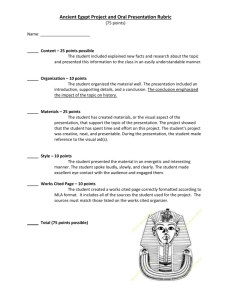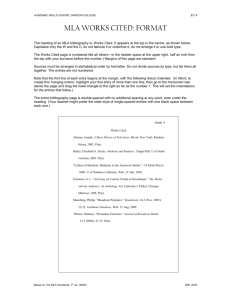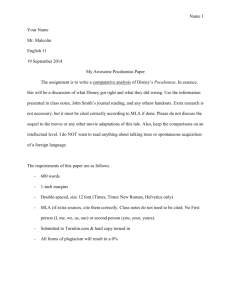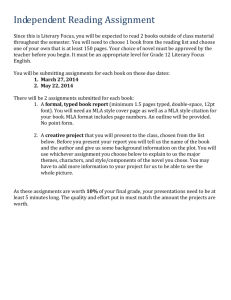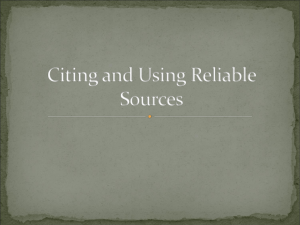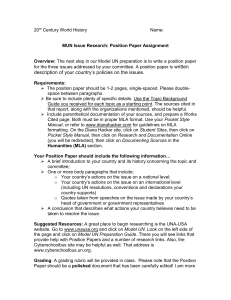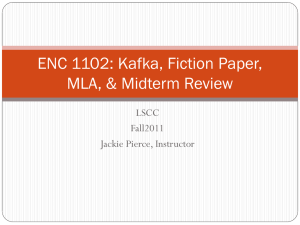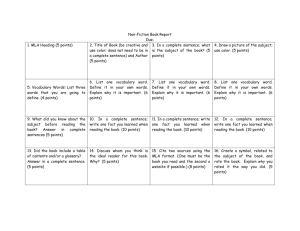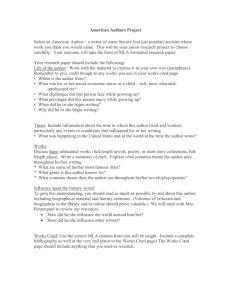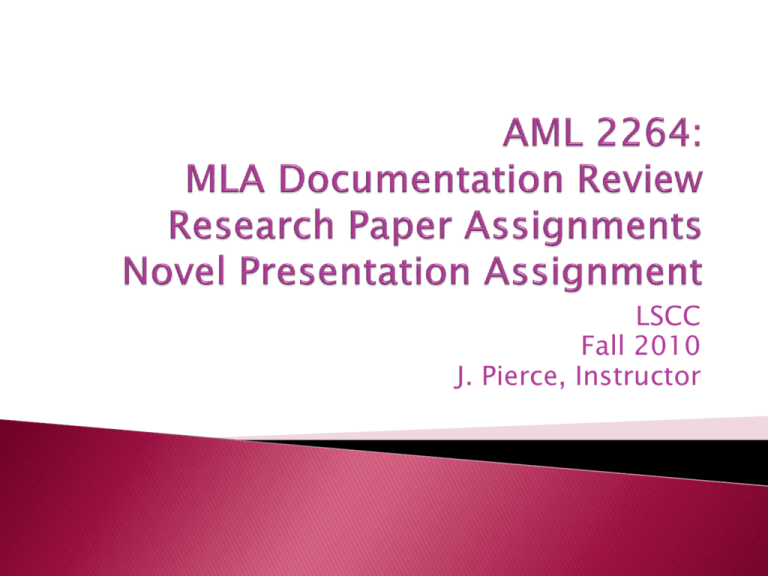
LSCC
Fall 2010
J. Pierce, Instructor
MLA Documentation Workshop
Conducting Literary Research @ LSCC
Official Assignments
◦ Midterm Paper
◦ Research Paper
◦ Oral Presentation
Do your works cited list as you locate
resources
Start with the stories themselves
Helpful tools
◦ A handbook such as The Little Brown Compact
Handbook
◦ Any library will also have the actual MLA Handbook
◦ DO NOT rely on Word 2007
◦ Sites like www.easybib.com
Author
Title of work
Title of source
Editors for anthologies
Page numbers for parts like articles, etc.
Dates of publication
Dates of access for electronic sources
Database names, owners, and location of
access
URLs
Still plain double-space
◦ Just like the rest of the paper
Part of the same document
◦ Header with page # continues on this last page
Works Cited
◦ Centered at the top of the page
The entries are alphabetized
Entries use the “hanging indent”
◦ Reverse of paragraph indent
Working together, let’s create works cited
entries for:
◦ The Awakening
◦ Readings from later in the text
Many of the book sources might collect essays:
Author. Title. Source. Edition. Editors. City:
Publisher, Year. Page range. Format.
For example:
◦ Mason, Bobbie Ann. “Shiloh.” Literature: An
Introduction to Fiction, Poetry, Drama and Writing.
10th ed. Eds. X.J. Kennedy and Dana Gioia. New York:
Pearson Longman, 2007. 604-612. Print.
The benefit of using an essay collection is that
you might find multiple sources in one book!
Book with an overall author:
◦ Author. Title. City: Publisher, Year. Print.
Book that collects essays:
◦ Author of essay. “Title of Essay.” Title of
Collection. Editor(s). City: Publisher, Year. Page
range of essay. Print.
Reference books—actual Encyclopedia:
◦ “Article.” Encyclopedia Title. Edition. Year. Print.
Samples abound on the library’s website
Here’s a sample from both of the Literary
Databases you’re targeting:
◦ Sackton, Alexander H. "A Note on Keats and Chaucer."
Modern Language Quarterly 13 (1952): 37-41. Literary
Reference Center. 16 Sept. 2010. Web.
◦ Wood, Michael. "Tolkien's Fictions." New Society 27 Mar.
1969. Literary Resources from Gale. 30 May 2010.
Web.
Web sources require:
◦ Author. “Title.” Webpage Title. Publisher, Date
published. Date Accessed. Web.
◦ The only time you’ll need the URL at the end now is
if it’s “hard to find.”
You really should not be using web sources
for your secondary material.
Overtly introduce/mention your sources
◦ In “Sunday in the Park,” by Bel Kaufman, we meet
Morton, a “city pale” university professor…
◦ According to Barbara Christian, Alice Walker’s use
of….
End cited material with a parenthetical
citation
◦
◦
◦
◦
What goes inside? (Author #)
If no author: (“Title” #)
If author previously mentioned, just (#)
If electronic and no actual page number available
(par. #)—this is new to MLA this year
It is NOT ok to just have a citation at the
end of a paragraph
◦ Implies that only the last sentence came from the
source
◦ Often, you will include a paragraph full of
information from the same source
By starting with a mention and ending with
a citation, you make it clear everything from
point a to point b came from that same
source
Examples….
o
John Doe’s early childhood
is still somewhat of a
mystery to scholars.
Nobody really knows much
about his school days. We
know he attended school
for at least part of his
childhood. “Doe was
apparently not a good
student. School records
indicate he was suspended
three times in one
semester” (Appleton 376).
o
John Doe’s early childhood
is still somewhat of a
mystery to scholars. Adam
Appleton’s book, Doe’s
Early Days, offers a little
insight into this man of
mystery. We know he
attended school for at least
part of his childhood.
Appleton asserts, “Doe was
apparently not a good
student. School records
indicate he was suspended
three times in one
semester” (376).
o
John Doe’s early childhood is still somewhat of
a mystery to scholars. Nobody really knows
much about his school days. We know he
attended school for at least part of his
childhood. “Doe was apparently not a good
student. School records indicate he was
suspended three times in one semester”
(Appleton 376).
Note how it could be just the quote, any part or the whole
paragraph that comes from Appleton’s book
Also, note how the quote isn’t attached to any other phrase
or sentence: DON’T DO THIS! Integrate quotes with at least
an opening phrase.
When writing about literature, you’ll quote
more from your primary sources and
paraphrase more from your secondary
sources
Even then, you don’t want lots of long
quotations
Make sure to format quotes properly
◦ In-text vs. Indented
Integrate and follow up on quotes
Put together your thoughts on novel and what
aspects you wish to cover
Pick passages from the novel that illustrate your
points
Research your stories to supplement your
discussion
◦ In some cases the research won’t cover what you’re
talking about
◦ In those cases, you can include some biographical,
historical, or other background with the research
For example, say I wanted to argue that the Celie in The
Color Purple suffers from low self-esteem. I could
research low self-esteem using psychological sources and
then tie to the story myself.
Let’s go to the Library…
How to find resources for all the
major assignments in AML 2264
The Mission: to write a
short research paper
exploring one aspect of
one of the works covered
thus far in AML 2264
Requirements:
◦ Minimum of three full pages
(not counting the Works Cited
page, of course)
◦ At least 2 reputable secondary
sources plus the novel
◦ MLA documentation
Category
Worth
On Time
10
Effective
Intro/Conclusion/Thesis
10
Thoughtful Analysis
20
Adequate Proof from
Primary Source
10
Use & Choice of Secondary
Sources
10
MLA Format &
Documentation
20
Grammar & Punctuation
20
Total
100
A character study
◦ Chopin: Leonce, Adele, Mademoiselle Reisz, Robert. If
choosing Edna, focus only on one role (wife, mother,
lover…).
◦ Hurston: Logan Killicks, Nanny, Joe Starks, TeaCake,
Mrs. Turner. If choosing Janie, focus on only one period
(like during a particular marriage, perhaps).
Trace a particular motif/theme
◦ Chopin: birds, art, ocean/swimming, manners…
◦ Hurston: trees, hair, folktales, speaking/silence…
Adopt a critical lens and apply it to a limited
aspect of the story
Essentially, you’re doing the same thing as you’re
doing in the Midterm Paper, just way more of it
Requirements:
◦ 6-8 pages
◦ At least 5 secondary sources in addition to the novel(s)
you use
Topics:
◦ Thematic discussions always work
Including tracing a similar theme through 2 books in a
comparison
◦ Might consider comparisons of characters within or
among novels
Starting in Week 11 (Nov. 1 & 3), individual
presentations begin
This can be on any aspect related to our study
◦ Most of you will tie in to either the Midterm or the main
Research Paper
◦ Could also, however, get inspiration from one of the
Reading or Research Responses, or even just something
a class discussion sparks in you
Required:
◦ 5-10 minutes
◦ PPT e-mailed to me prior to your day to present
◦ Document any sources used just as you would in a paper
Utilize PowerPoint for presenting the information
Presentations should be about 15 minutes in length
Should address the content of the novel, but not just summarize the
plot
Organize your discussion around the formal elements of discussing
fiction:
◦ Plot
Conflict, rising action, climax, falling action, resolution
◦ Character
◦
◦
◦
◦
Protagonist/antagonist
Other major characters
Important minor characters
Setting
Point of view
Theme(s)
Critical reaction?
Document sources as you would for a paper
Last slide will be Works Cited
Can also include biographical/historical information about the author
and period in which it is written
Use fairly simple background
Slides should be outline of talk, not every
word you plan to say
◦ Can use Notes section for that
Check grammar and punctuation VERY
CAREFULLY
Avoid overly heavy animation
Will need to save on a jump drive or email to
me in advance so that I can bring it to class
with me
Next two weeks will be spent on Zora Neale
Hurston’s Their Eyes were Watching God
After that, Carson McCullers’ The Ballad of
the Sad Cafe

